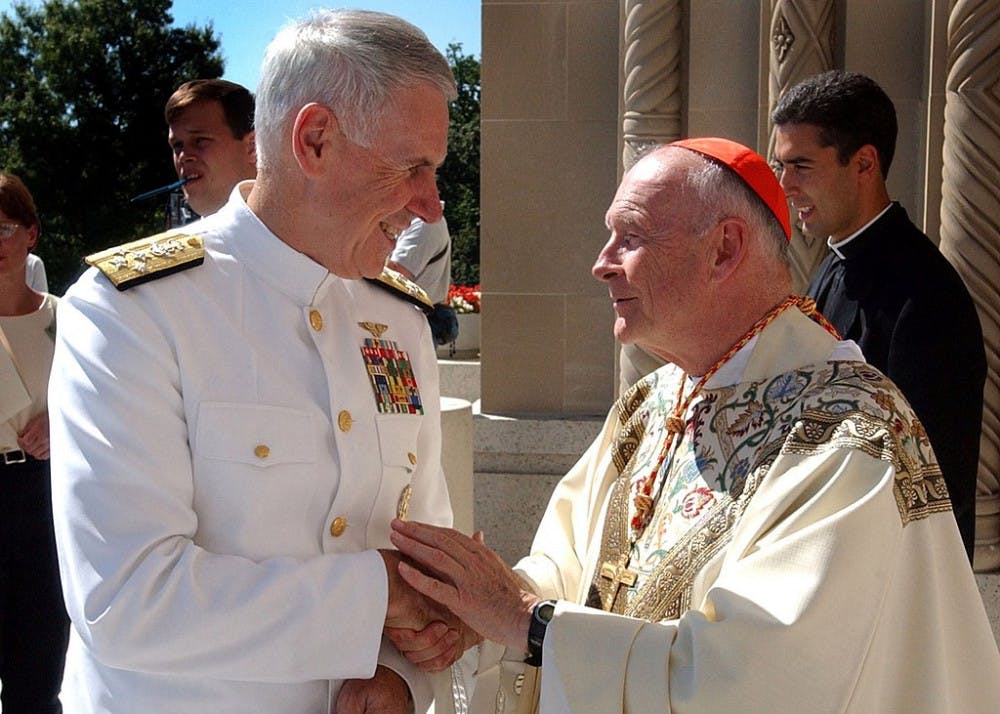After a nearly yearlong review, the Seton Hall University Board of Regents released an update to the SHU community on August 28 detailing the investigation into Former Cardinal Theodore McCarrick’s alleged actions between 1986 and 2000 when he served as archbishop. Latham & Watkins, the law firm that was retained to perform the investigation found that McCarrick created a “culture of fear and intimidation that supported his personal objectives” and that he used his platform to sexually harass seminarians at both the Immaculate Conception Seminary and St. Andrew’s Seminary at Seton Hall University.

It is worth noting that this update was the result of a conversation between the Board of Regents and Latham & Watkins, according to a Seton Hall official. A written report to the Board detailing the full extent of the review is expected shortly, according to the email from Patrick Murray, chairman of the Board of Regents.
Murray did not respond to The Setonian’s request for comment.
During this review, it was also determined that no minors or other University students were harrassed by McCarrick. The summary went on to conclude that Seton Hall’s Title IX policies are consistent with state and federal law, but that at both seminaries during McCarrick’s time there, the policies were not always followed. This led to the incidents of sexual harassment going unreported to the proper University officials.
Seton Hall did not release the details of how many victims were involved, what exactly McCarrick did or if any University officials tried to cover up the allegations. The University did, however, release a step-by-step plan to “strengthen the University’s compliance systems and governance structures to better support all members of the University community.” These actions include, but are not limited to, commissioning an additional independent review of the allegations against McCarrick, sharing the findings of these reviews with the University community and funding and hiring a Chief Compliance and Ethics Officer to “ensure University-wide adherence to Title IX laws, policies and practices.”
When asked for additional comment from Seton Hall’s media relations department, The Setonian was told that the email from the Board gave the best summation of how the University feels in relation to the review.
Rishi Shah, president of the Student Government Association (SGA), said that the email was, to him, “sufficient enough to inform the student body of the findings of this investigation.”
“This information was verbally disclosed last Tuesday and an email to the entire Seton Hall community was sent later that evening,” Shah said. “A formal written document is in the works and that will be released to proper legal entities thereafter.”
When asked if Seton Hall should release the full, independent, unrestricted review of McCarrick’s actions, Shah said he believes they should, but that keeping the lives of his victims in mind should be a top priority of the University.
“My first concern is the mental health and well-being of our students, seminarians, and the victims of these horrendous incidents,” Shah said. “The victims need to be considered as publicly releasing these awfully personal and horrendous encounters can negatively impact their livelihood. Keeping this in mind, I agree that there needs to be transparency within the seminaries, especially the one on campus as they should be upheld to the same legal conditions as the rest of the institution. Situations such as these cannot be internally resolved.”
Despite the email, Robert Hoatson, a former resident of Immaculate Conception Seminary, a former priest of the Archdiocese of Newark and a participant in the Latham and Watkins study, held a demonstration outside the main entrance of Seton Hall’s campus on August 30.
In an interview with The Setonian, Hoatson said that he was responding to the Board of Regents email that was sent to the Seton Hall community. To him, it sounded like “Bill Barr summarizing the Mueller report.”
Hoatson said that he does understand the full report will be released shortly but noted that the email from the Board of Regents was not sent to him, he had it forwarded to him. To Hoatson, this already sets a bad precedent for communication with the victims, so he worries whether he will see the full report when it is released.
Hoatson said that he was a student at Immaculate Conception from 1994 to 1996, and he witnessed “various and sundry” things that went on.
“Groups of seminarians were petrified on Friday afternoons, for example, that a phone call would come in and the rector would come to class and say, ‘Listen, you guys have been invited to the Jersey shore by Archbishop McCarrick.’ That meant you have to go,” Hoatson said. “When they arrived at the house in Sea Girt, they would always be one bed short, and that meant someone had to sleep with Archbishop McCarrick. That went on for many, many years.”
It was because of this experience, that Hoatson feels he has a right to know about any information that is released to the Seton Hall community.
“By conducting the study, Seton Hall did a good thing, but it will not continue to be good unless the results are open, honest and transparent,” Hoatson said.
Hoatson is also the co-founder and president of Road to Recovery, a non-profit organization that assists victims of sexual abuse, particularly at the hands of those of the clergy.
Isabel Soisson can be reached at isabel.soisson@student.shu.edu. Find her on Twitter @IsabelSoisson





